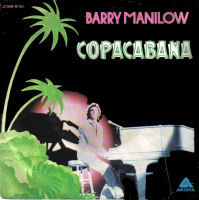Loading AI tools
1978 single by Barry Manilow From Wikipedia, the free encyclopedia
"Copacabana", also known as "Copacabana (At the Copa)", is a song recorded by Barry Manilow. Written by Manilow, Jack Feldman, and Bruce Sussman, it was released in 1978 as the third single from Manilow's fifth studio album, Even Now (1978). The same year, "Copacabana" appeared in the soundtrack album of the film Foul Play.
| "Copacabana (At the Copa)" | ||||
|---|---|---|---|---|
 | ||||
| Single by Barry Manilow | ||||
| from the album Even Now | ||||
| B-side | "A Linda Song" | |||
| Released |
| |||
| Recorded | 1978 | |||
| Length |
| |||
| Label | Arista | |||
| Songwriter(s) | Barry Manilow, Jack Feldman, Bruce Sussman | |||
| Producer(s) | Danny Lawrence, Ron Dante | |||
| Barry Manilow singles chronology | ||||
| ||||
| Audio | ||||
| "Copacabana" on YouTube | ||||
| "Copacabana" (radio edit) on YouTube | ||||
The song was inspired by a conversation between Manilow and Sussman at the Copacabana Hotel in Rio de Janeiro, when they discussed whether there had ever been a song called "Copacabana". After returning to the U.S., Manilow – who, in the 1960s, had been a regular visitor to the Copacabana nightclub in New York City – suggested that Sussman and Feldman write the lyrics to a story song for him. They did so, and Manilow supplied the music.[1]
Lola Falana inspired the song's famous lyric, "Her name is Lola / She was a showgirl..."[2]
The song's lyrics refer to the Copacabana nightclub as "the hottest spot north of Havana". The story focuses on Lola, a Copacabana showgirl, and her sweetheart Tony, a bartender at the club. One night, an ostentatiously wealthy man named Rico takes a fancy to Lola, but Tony intervenes when Rico becomes aggressive. The ensuing brawl ends in a gun being fired; although it is initially unclear "who shot who[m]", it soon becomes apparent that Tony has died. Thirty years later, the club has been transformed into a discotheque, but a middle-aged Lola remains in her showgirl attire, now a customer at the bar who "drinks herself half blind" lamenting the loss of her youth, her sanity and Tony.[3]
"Copacabana" debuted on Billboard magazine's Top 40 chart on July 7, 1978, and peaked at number 8. It has also reached the Top 10 in Belgium, Canada, France and the Netherlands. Internationally, the song is Manilow's third-greatest hit.[4] The track was his first gold single for a song he wrote or co-wrote.[5] Additionally, the song earned Manilow his first and only Grammy Award for Best Male Pop Vocal Performance in February 1979.[6]
Cash Box said that "a Latin beat, congas and added percussion, strings and horns make it unusual."[7]
In 1985, Manilow and his collaborators Bruce Sussman and Jack Feldman expanded the song into a full–length, made-for-television musical, also called Copacabana, writing many additional songs and expanding the plot suggested by the song.
This film version was then further expanded by Manilow, Feldman, and Sussman into a full-length, two-act stage musical, again titled Copacabana, which ran at the Prince of Wales Theatre on London's West End for two years prior to a lengthy tour of the UK. An American production was later mounted that toured the US for over a year. Over 200 productions of the show have since been mounted worldwide.
Weekly charts
|
Year-end charts
|
| Region | Certification | Certified units/sales |
|---|---|---|
| United Kingdom (BPI)[29] | Silver | 200,000‡ |
| United States (RIAA)[30] | Gold | 1,000,000^ |
|
^ Shipments figures based on certification alone. | ||
Seamless Wikipedia browsing. On steroids.
Every time you click a link to Wikipedia, Wiktionary or Wikiquote in your browser's search results, it will show the modern Wikiwand interface.
Wikiwand extension is a five stars, simple, with minimum permission required to keep your browsing private, safe and transparent.